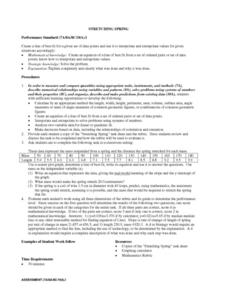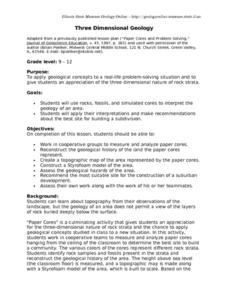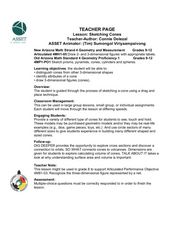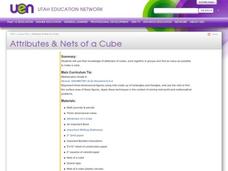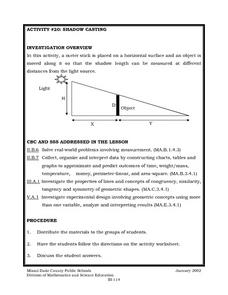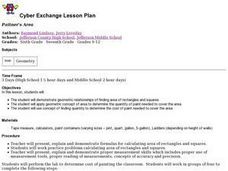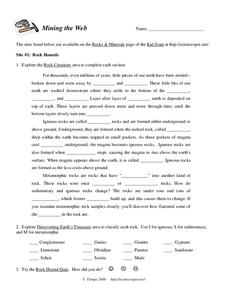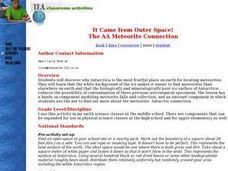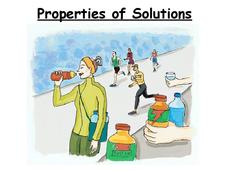Curated OER
STRETCHING SPRING
Students calculate the length, width, height, perimeter, area, volume, surface area, angle measures or sums of angle measures of common geometric figures. They create an equation of a line of best fit from a set of ordered pairs or...
Earth Day Network
Staying Green While Being Clean
Clean up the environment with a lesson plan that focuses on replacing hazardous cleaning supplies with green, environmentally-friendly products. Using a dirty patch of surface as a control area, kids clean other parts of various surfaces...
Curated OER
Three Dimensional Geology
Here is a fine lesson plan on geology designed for high schoolers. Learners use rocks, fossils, and other geological clues to determine the geology of an area. Then, they make recommendations to a fictitious city council about the...
Curated OER
Sketching Cones
Students sketch cones and identify its properties. In this geometry lesson, students calculate the surface area and volume of each three dimensional shape. they define and sketch prisms, pyramids and cylinders.
Curated OER
Opening A Cube
Fifth graders investigate mathematical concepts related to the construction of a three dimensional cube. They construct the cube from two dimensional patterns and compute the surface area. Students also define the faces, edges, and...
Curated OER
Math: Equal Area Triangles
Students examine a math worksheet and determine how to divide a single triangle into four of equal area. Using geometric principles, they sketch two additional ways to divide into into four equal triangles. To conclude, students...
Curated OER
Attributes & Nets of a Cube
Third graders engage in a lesson that focuses on the attributes and forming of a cube. They construct a cube using different combinations while comparing a square with only two-dimensions. Students fold paper while following the...
Curated OER
Shadow Casting
Eighth graders use a meter stick that is placed on a horizontal surface and an object is moved along it so that the shadow length can be measured at different distances from the light source. They solve real-world problems involving...
Curated OER
Painter's Area
Learners demonstrate geometric relationships of finding area of rectangles and squares. They apply determine the quantity of paint needed to cover the area by using the concept of quantity.
Science Geek
Kinetic Molecular Theory
The fourth presentation in a series of five begins with information about the nature of gases and what to expect from them. Then it discusses kinetic molecular theory, diffusion, and Graham's Law, and concludes with the purification of...
NOAA
The Great, Glowing Orb What You Will Do: Make a Solar Heat Engine
How is solar energy able to move wind and water to control the climate? Scholars explore the concept of solar energy in the first of 10 activities in the Discover Your Changing World series. They follow instructions to build homemade...
Mathematics Assessment Project
Designing a 3d Product in 2d: a Sports Bag
Sew up pupil interest with an engaging, hands-on instructional activity. Learners first design a sports bag given constraints on the dimensions of fabric. They then evaluate provided sample responses to identify strengths and weaknesses...
Curated OER
Lead Up Skills fo Tchoukball
A simple lesson to practice the throwing and catching skills for the game of Tchoukball. There are several warm-up activities to have the class practice tossing a ball around. Then the main drill is organized much like a basketball...
Curated OER
Geometry and Tony Smith Sculpture
Students respond to Tony Smith's sculpture as art and brainstorm about math concepts inherent in his work. They create a sculpture with polyhedra nets, calculate the cost of covering sculpture in gold, and write an exhibit label for...
Curated OER
Design-a-Lesson-Packaging a Product
Students in a teacher education class address consumer related issues involving packaging. Using volume, surface area and graphs, they create a package for a given volume of a product. They design modifications for this lesson and to...
National Wildlife Federation
Wherefore Art Thou, Albedo?
In the sixth lesson in a series of 21, scholars use NASA data to graph and interpret albedo seasonally and over the course of multiple years. This allows learners to compare albedo trends to changes in sea ice with connections to the...
Curated OER
Mining the Web
In this rock and mineral instructional activity, learners visit http://sciencespot.net and explore a variety of sites about rocks and minerals in order to complete questions about geology, the rock cycle, and rock creations.
Colorado State University
Why Does the Wind Blow?
Without wind, the weather man wouldn't have much to talk about! Blow away your junior meteorologists with a creative demonstration of how wind works. The activity uses an empty soda bottle and compressible Styrofoam peanuts to illustrate...
Curated OER
Cones, Cylinders, Spheres
Students classify polygons by name and shape. In this geometry instructional activity, students identify the lateral surface of each conic. They differentiate between cones, cylinders and spheres.
Curated OER
It Came from Outer Space! The AA Meteorite Connection
Young scholars discover why Antarctica is the most fruitful place on earth for locating meteorites. They work in groups. Students are given a Museum or University Name for each group. They are explained that each group is allowed to...
Curated OER
Colonizing the Stars
Middle schoolers compare and contrast the size, composition and surface features of the nine planets of our solar system with the possible sizes and compositions of extra -solar planets.
Science Geek
Reaction Kinetics
Show your classes the science behind rates of reactions with a presentation that explains factors that affect the rate, activation energies, exothermic and endothermic processes, and the proportionality of the product and reactant rates.
Science Geek
Properties of Solutions
Study the properties of solutions as they relate to mixtures. The slide show presents the key concepts involved with solutions including solvents, solutes, solubility, and electrolytes. Scholars learn the basics of the properties of...
Curated OER
Around the Clock
Middle schoolers discover the relationship between the circumference of a circle and its diameter. They find the length of an arc of a circle.Students use estimation strategies in real-world applications to predict results (i.e.,...


